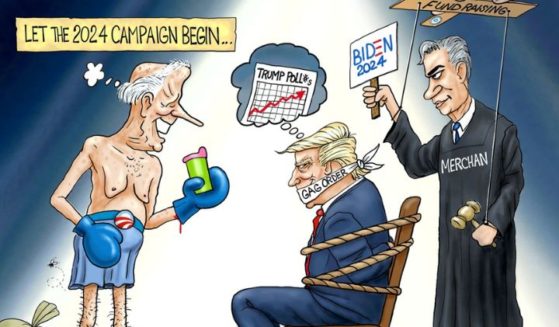Op-Ed: Sussmann's Judge Took a Rule That Wouldn't Free a Drunk Driver and Used It to Help Him Get Off the Hook
On Tuesday, much of the American nation — especially supporters of former President Donald J. Trump — were shocked at the full acquittal granted to Hillary Clinton’s campaign lawyer, Michael J. Sussmann.
Conservatives were furious, struggling to understand the acquittal. The other side of the political spectrum was likewise baffled when reports came out from legacy media outlets that admitted that Sussmann engaged in unethical and perhaps illegal behavior to benefit Clinton’s presidential campaign and slander Trump at a crucial time immediately before the 2016 election.
During the closing statements, Sussmann’s defense attorney, Sean Berkowitz, declared, “I’m not going to come up here and tell you that Mr. Sussmann was not working on a story related to Alfa Bank and working with The New York Times on that. Of course he was. Opposition research is not illegal.”
“There is no doubt that Mr. Sussmann sent this text: ‘I’m coming on my own [to the meeting] — not on behalf of a client or company — want to help the [FBI].’ … He sent that. We own that.”
Berkowitz further acknowledged that it was clear to all that Sussmann was directly affiliated with both Clinton and the Democratic National Convention, especially regarding the creation of The New York Times story attacking Trump with the now-debunked claim that he was colluding with Russia.
Wait, what? These are the closing statements of Sussmann’s defense attorneys! Why would they ever admit all of that?
Because, as Berkowitz noted next, those accusations were not what Sussmann was on trial for.
“What’s charged in this case is what was said on Sept. 19 in that meeting with [then-FBI general counsel James A. Baker] where there are no notes … [nothing] other than Mr. Baker’s word.”
“It is highly unlikely that Mr. Sussmann would have repeated that statement. He had told him on Sept. 18 [via text message] he wasn’t coming on behalf of a client. … I submit to you that the government has not proved beyond a reasonable doubt that on Sept. 19 Mr. Sussmann repeated the words of the text.”
This is the primary factor that drove the jury (or gave them an easy excuse) to fully acquit Michael Sussmann.
On Thursday, Judge Christopher Cooper instructed the jury to only determine if Sussmann lied to the FBI about his working on behalf of Clinton and the DNC at the 15- to 30-minute meeting on Sept. 19, 2016. Any false statements to the FBI before or after that meeting as well as much of the surrounding context were prohibited from consideration and shielded from prosecution. That means the fact that Sussmann indisputably lied the day before had no bearing on the case.
Thus, with the blessing and facilitation of the judge, Sussmann’s attorneys bizarrely argued that their client, in a sense, was so guilty on Sept. 18 that it didn’t make sense that he would have repeated the crime the next day.
Berkowitz showered the jury with many more absurd arguments.
In one example, he stated, “Is what [Sussmann] said false: ‘I did not come here on behalf of any particular client’? That is a true statement. There were two clients that he had talked about. These two clients are Hillary for America and Rodney Joffe. … When you go somewhere on behalf of a client, you are advocating for them. … You are asking. Mr. Sussmann didn’t ask Jim Baker for anything. … There’s a difference between having a client and going somewhere on their behalf.”
Here, Sussmann’s defense is seemingly claiming that since Sussmann was actually representing two clients, i.e., more than one and grammatically plural, one could argue that Clinton and Joffe’s operative was technically telling the truth. Similarly, Berkowitz makes the ridiculous claim that somehow being an advocate for a client doesn’t count if there is no recorded, specific request made on the client’s behalf.
Sussmann’s attorney also made an eyebrow-raising statement that was eerily reminiscent of Clinton’s own rhetoric at the Benghazi hearings of 2013: “What difference, at this point, does it make?”
“Did it matter?” Berkowitz said. “Let’s assume for the sake of argument that [Sussmann] was working on behalf of the Hillary Clinton campaign. Would it have mattered? No.”
At this point, Berkowitz made a very unexpected argument against the FBI on Sussmann’s behalf.
He suggested that Baker, the Obama-era general counsel, and the rest of the FBI knew full well that Sussmann was affiliated with Clinton and the DNC. Therefore, it is unlikely that Sussmann would have attempted to deceive the FBI in this regard. Using carefully crafted legal jargon, Sussmann’s attorneys tiptoed towards a very subtle hint that the FBI (and Baker in particular) were fully aware that Sussmann was operating on behalf of Clinton and the DNC all along.
Baker was a colleague of James Comey and the forerunner of Robert Mueller. He was also investigated for illegal leaks to the media that never amounted to any charges. This context leads us to wonder if the federal prosecution — and possibly even John Durham himself — were more concerned with attempting to exonerate corrupt elements within the FBI and other Department of Justice agencies than actually prosecuting Clinton and her colleagues and providing justice to Trump.
As noted by defense attorney and legal commentator Robert Gouveia, who reviewed the Sussmann trial at great length, the secret to Sussmann’s full acquittal most likely lay in the jury instructions issued by Cooper. Besides the limitation to the single meeting on Sept. 19, 2016, Gouveia explained that Cooper added the instruction that if the jury believed that Sussmann acted “in good faith and not with the intention to break the law,” they must acquit him.
It is not clear what possible legal basis this jury instruction has. Gouveia rhetorically inquired, for example, when a drunk driver is ever acquitted because he got behind the wheel erroneously believing he was sober enough to drive home. Ignorance or supposed “good intentions” are never considered in the context of whether or not the law has been broken, especially in a trial.
And yet, in Sussmann’s case, the District of Columbia jury was instructed by an Obama-appointed judge to give the defendant a full acquittal if they felt that Sussmann believed he was acting to save America from the evils of Donald Trump and his (undeniably fictitious) “Russian collusion.”
A liberal mentality and Snopes-style semantic game-playing pervaded the most crucial elements of Sussmann’s trial. The jury was ordered to grant Sussmann a full acquittal if they felt that any of the defense’s ridiculous technicalities held even the slightest weight. If they — including jurors taken from a pool that included DNC donors — believed that Sussmann’s actions were illegal but came from a good place, then it was their “duty” to acquit him.
As liberal doctrine teaches, it’s not about right or wrong; it’s about the end justifying the means. It’s about shielding one political tribe from accountability while hounding its political opposition with the fury of an inquisitor. It’s about the elitist hypocrisy that George Orwell described in such works as “Animal Farm” and “Nineteen Eighty-Four” as the first stages of dangerous tyranny.
Trump used his new social media platform, Truth Social, to comment on the verdict. “Our Legal System is CORRUPT, our Judges (and Justices!) are highly partisan, compromised, or just plain scared.”
As usual, it’s hard to disagree with the 45th president of the United States. And we can’t help but wonder if the federal government would ever give ordinary citizens (especially of a conservative persuasion) such leniencies as striking the most incriminating evidence from consideration and demanding an immediate acquittal for “good intentions.”
I wouldn’t count on it.
The views expressed in this opinion article are those of their author and are not necessarily either shared or endorsed by the owners of this website. If you are interested in contributing an Op-Ed to The Western Journal, you can learn about our submission guidelines and process here.
Truth and Accuracy
We are committed to truth and accuracy in all of our journalism. Read our editorial standards.












